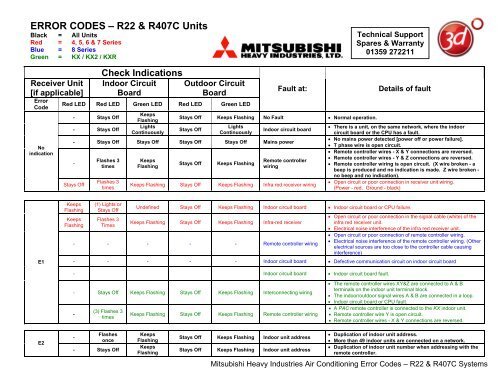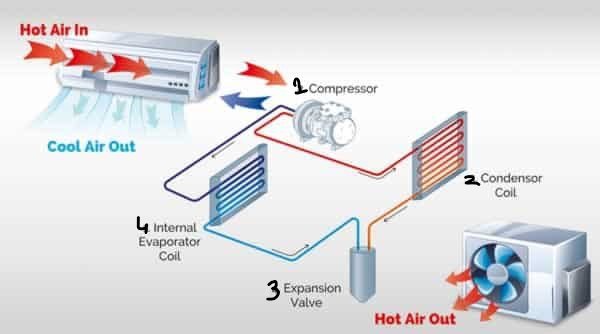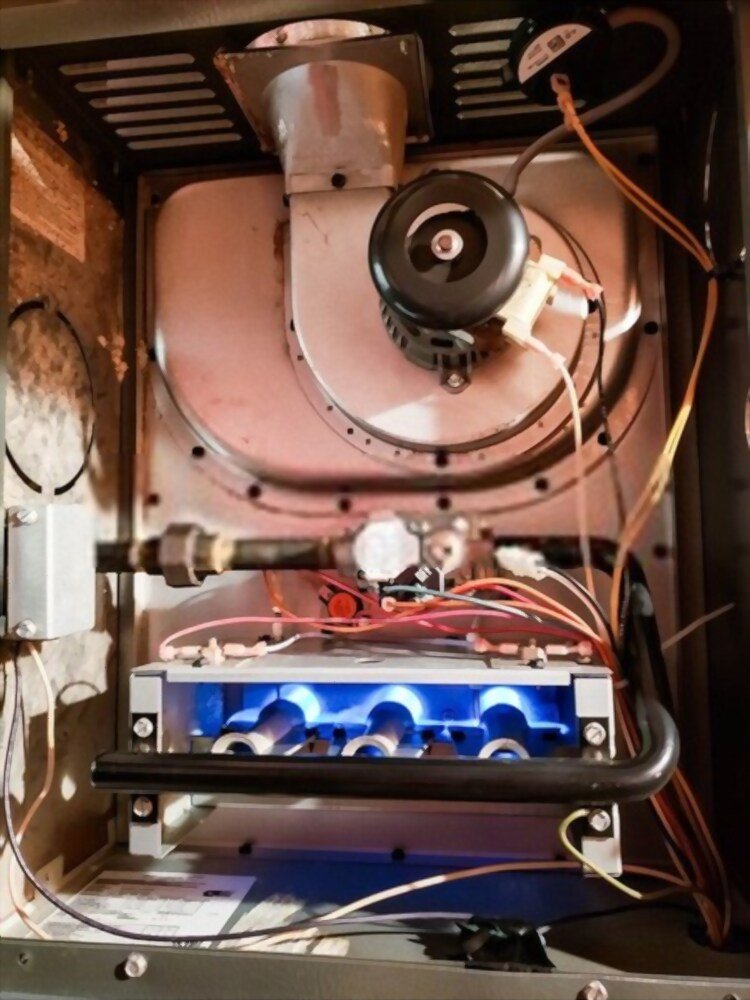Discover Effective Solutions: How To Fix Musty Ac Smell
To fix a musty AC smell, you need to identify and address the underlying issue, which is often mold or mildew. Here are some steps to help eliminate the odor and improve air quality: 1. Clean or replace the air filter regularly. 2. Check for any signs of mold or mildew in the AC unit and clean it if necessary. 3. Use a mold and mildew cleaner or a solution of vinegar and water to clean the evaporator coil. 4. Ensure proper drainage by clearing any clogs in the condensate drain line. 5. Use a dehumidifier or increase ventilation in the area to reduce moisture levels. 6. Consider using an air purifier or installing UV lights in the AC unit to prevent future mold growth. By following these steps, you can eliminate the musty smell and enjoy fresh, clean air from your AC unit.
It’s a hot summer day, and you find solace in the cool, refreshing air of your air conditioning system. But as you take a deep breath, a musty smell fills your nostrils, instantly dampening your comfort.
It’s a common problem faced by homeowners and renters alike: a persistent, unpleasant odor emanating from their AC units. What could be the cause of this unwelcome scent? And more importantly, how can it be fixed? The answer lies in identifying and addressing the underlying issue.
A musty AC smell can indicate the presence of mold or mildew, which not only affects the quality of the air you breathe but also poses potential health risks. From small particles triggering allergies to the growth of harmful bacteria, ignoring this problem could have dire consequences. Fortunately, effective solutions exist to rid your AC of that musty odor and restore a fresh, clean environment to your home.
In this article, we will delve into the causes of this unpleasant smell and guide you through the step-by-step process of eliminating it. From preventive measures to targeted remedies, we will equip you with the knowledge and tools needed to ensure your home’s air is as invigorating as it is refreshing. So let’s dive in and discover how to fix that musty AC smell once and for all.
I. Understanding the Musty AC Smell
Before diving into the solutions, it’s essential to understand what causes that musty AC smell and the potential health hazards associated with it.
A. Causes of Musty AC Smell
The musty smell in your AC system can stem from various factors, including:
- 1. Mold and Mildew: The most common cause of a musty odor is the presence of mold and mildew in the AC unit. These fungi thrive in dark, damp environments, such as the condenser coils, air ducts, and drip pans.
- 2. Clogged Drain Line: If the drain line becomes clogged with debris or algae, stagnant water can accumulate, leading to a musty smell.
- 3. Dirty Air Filters: Over time, air filters can become clogged with dust, dirt, and other pollutants. This buildup can create a musty odor when the AC is running.
- 4. Moisture Accumulation: Excessive moisture in the AC system can promote the growth of mold and mildew, resulting in a musty smell.
B. Potential Health Hazards Associated with Musty AC Smell
While a musty AC smell may seem like a minor inconvenience, it can actually pose health risks for you and your family. Here are a few potential hazards:
- 1. Allergic Reactions: Mold and mildew spores can trigger allergies, leading to symptoms like sneezing, coughing, itchy eyes, and a runny nose.
- 2. Respiratory Issues: Breathing in mold spores can irritate the respiratory system, causing respiratory problems, especially in individuals with asthma or other respiratory conditions.
- 3. Bacterial Infections: The presence of mold and mildew can also lead to bacterial growth, increasing the risk of respiratory infections.
Now that we understand the causes and potential hazards, let’s move on to assessing and diagnosing the issue.
II. Assessing and Diagnosing the Issue
To effectively fix the musty AC smell, it’s crucial to accurately assess and diagnose the underlying problem. Let’s explore the signs and symptoms to look out for and how to inspect your AC system for mold and mildew buildup.
A. Signs and Symptoms of a Musty AC Smell
Recognizing the signs and symptoms of a musty AC smell can help you identify the issue and take appropriate action. Keep an eye out for the following:
- 1. Unpleasant Odor: The most obvious sign is a musty or moldy smell coming from your AC vents.
- 2. Allergy Symptoms: If you or your family members experience increased allergy symptoms when the AC is running, it could indicate the presence of mold or mildew.
- 3. Poor Air Quality: Mold spores released into the air can reduce the overall air quality in your home, causing discomfort and potential health issues.
B. Inspecting Air Filters and Vents
Start by inspecting your AC’s air filters and vents, as they are common areas for mold and mildew buildup. Here’s what you need to do:
- 1. Turn off the AC system and locate the air filters.
- 2. Remove the filters and check for any signs of mold, mildew, or dirt buildup.
- 3. If the filters are dirty or have mold growth, they need to be replaced.
- 4. Additionally, inspect the vents and ensure there is no visible mold or mildew present.
Next, let’s move on to checking for mold and mildew in other components of the AC system.
C. Checking for Mold and Mildew Buildup
To thoroughly check for mold and mildew buildup, follow these steps:
- 1. Inspect the condenser coils: Mold and mildew can accumulate on the condenser coils, affecting the efficiency of your AC and causing a musty smell. If you notice any visible signs of mold or mildew, it’s recommended to clean the coils.
- 2. Check the drip pans and drain line: These components are prone to mold and mildew growth due to the presence of excess moisture. Ensure that the drip pans are clean and the drain line is clear of any clogs.
Once you have assessed and diagnosed the issue, it’s time to take preventive measures to avoid future occurrences of the musty AC smell.
III. Preventive Measures to Avoid Musty AC Smell
Regular maintenance and controlling humidity levels are key to preventing the musty AC smell. Let’s explore some preventive measures you can take.
A. Regular AC Maintenance
Regular AC maintenance is crucial to keep your system running efficiently and prevent the buildup of mold and mildew. Here are some maintenance tasks to include in your routine:
1. Changing Air Filters
Regularly replace your AC’s air filters to ensure proper airflow and prevent dirt and debris from accumulating. Aim to change the filters every 1-3 months, depending on the manufacturer’s recommendations.
2. Cleaning Condenser Coils
Over time, the condenser coils can collect dirt and dust, creating a breeding ground for mold and mildew. Include coil cleaning in your regular maintenance routine to keep them free from buildup.
3. Clearing Clogged Drain Lines
Regularly check your AC’s drain lines for any clogs. If you notice a blockage, use a wet/dry vacuum or a specialized cleaning solution to clear it. This will prevent stagnant water and mold growth.
B. Controlling Humidity Levels
Excess humidity can contribute to the growth of mold and mildew in your AC system. Take these steps to control humidity levels:
1. Installing a Dehumidifier
If the humidity levels in your home are consistently high, consider installing a dehumidifier. This device will remove excess moisture from the air, reducing the chances of mold and mildew growth.
2. Utilizing Ventilation Systems
Ensure proper ventilation in your home by using exhaust fans in areas prone to moisture, such as bathrooms and kitchens. Good airflow helps to control humidity and minimize mold and mildew growth.
By implementing these preventive measures, you can significantly reduce the likelihood of encountering a musty AC smell. However, if the smell persists, it’s essential to clean your AC system thoroughly.
IV. Cleaning the AC System
Cleaning your AC system is a crucial step in eliminating the musty smell and preventing future occurrences. Let’s explore some DIY cleaning methods and the option of hiring professional cleaning services.
A. DIY Cleaning Methods
If you prefer a hands-on approach, you can try these DIY methods to clean your AC system:
1. Using Vinegar and Water Solution
Mix equal parts vinegar and water in a spray bottle. Spray the solution onto the condenser coils, drip pans, and air filters. Let it sit for a few minutes to loosen any dirt or mold, then rinse with clean water.
2. Applying Baking Soda and Water Paste
Create a paste by mixing baking soda and water. Apply the paste to the affected areas, such as the condenser coils, drip pans, and air filters. Let it sit for a while before rinsing off with water.
B. Professional Cleaning Services
If DIY methods don’t yield satisfactory results or you prefer to leave the task to professionals, consider hiring a professional cleaning service. Here are the benefits of opting for professional AC system cleaning:
1. Benefits of Hiring Professionals
- – Expertise: Professionals have the knowledge and experience to thoroughly clean AC systems and eliminate the musty smell.
- – Time-Saving: Cleaning the entire AC system can be time-consuming, especially if you’re unfamiliar with the process. Professionals can complete the task efficiently.
- – Comprehensive Cleaning: Professionals have specialized equipment and solutions to ensure a deep and thorough cleaning of your AC system.
2. Process of Professional AC System Cleaning
When you hire professionals to clean your AC system, they typically follow these steps:
- – Inspection: They will assess the condition of your AC system and identify any underlying issues.
- – Disassembly: Various components of the AC system, such as the air handler, condenser, and coils, will be disassembled to access and clean them thoroughly.
- – Cleaning: Professionals will use specialized cleaning solutions and tools to remove mold, mildew, dirt, and debris from the components.
- – Reassembly: After cleaning, the components will be reassembled, ensuring everything is in proper working order.
Professional cleaning services guarantee a fresh and odor-free AC system, promoting clean and healthy air in your home.
V. Eliminating Mold and Mildew Growth
In addition to cleaning your AC system, it’s crucial to address any existing mold and mildew growth. Let’s explore how to identify problem areas and safely remove mold and mildew.
A. Identifying Mold and Mildew Problem Areas
To effectively eliminate mold and mildew, you need to identify the problem areas. Focus on these common locations:
- – Air ducts and air vents
- – Condenser coils
- – Drip pans and drain lines
Inspect these areas for visible signs of mold and mildew, such as black or greenish patches.
B. Safe Removal of Mold and Mildew
Once you’ve identified mold and mildew, it’s essential to remove them safely. Consider these methods:
1. Using Commercial Mold Removal Products
Commercial mold removal products, such as sprays or wipes, can effectively eliminate mold and mildew. Follow the product instructions carefully, ensuring proper ventilation during the process.
2. Natural Remedies for Mold and Mildew Removal
If you prefer natural remedies, you can try these alternatives:
a. Activated Charcoal
Place activated charcoal near the affected areas. The charcoal will absorb moisture and help eliminate mold and mildew odors.
b. Essential Oils
Some essential oils, such as tea tree oil or lavender oil, have natural antifungal properties. Mix a few drops with water and spray the solution onto the affected areas to inhibit mold and mildew growth.
By effectively eliminating mold and mildew, you can ensure a healthier and odor-free AC system.
VI. Deodorizing the AC System
Even after cleaning and eliminating mold and mildew, a lingering odor may persist. Deodorizing your AC system can help freshen the air. Let’s explore some deodorizing options.
A. Using Air Fresheners and Deodorizing Sprays
One simple way to deodorize your AC system is by using air fresheners and deodorizing sprays. These products are readily available and can help mask any remaining odors. However, it’s important to choose non-toxic and non-chemical options to maintain good air quality.
B. Natural Deodorizing Options
If you prefer natural alternatives to artificial air fresheners, consider these options:
1. Activated Charcoal
As mentioned earlier, activated charcoal is an excellent natural deodorizer. Place charcoal sachets or bags near the air vents to absorb odors.
2. Essential Oils
Essential oils not only provide a pleasant aroma but also have antimicrobial properties. Add a few drops of your favorite essential oil to a cotton ball or diffuser and place it near the air vents for a natural and long-lasting fragrance.
By deodorizing your AC system, you can enjoy a fresh and inviting atmosphere in your home.
VII. Maintaining a Fresh AC System
Maintaining a fresh AC system requires regular cleaning and upkeep. Let’s explore a cleaning routine and essential maintenance tasks to keep your AC smelling fresh.
A. Regular Cleaning Routine
Adopting a regular cleaning routine will help keep your AC system in optimal condition. Here’s a monthly cleaning checklist:
1. Monthly Cleaning Checklist
- – Change air filters
- – Inspect and clean condenser coils
- – Clear any clogs in drain lines and drip pans
- – Wipe down air vents and duct openings
2. Seasonal Maintenance Tasks
In addition to monthly cleaning, there are some seasonal maintenance tasks to consider:
- – Before summer: Inspect and clean the entire AC system, including the condenser unit and outdoor components.
- – Before winter: Perform any necessary repairs or maintenance to ensure your AC system is in good condition for the off-season.
By following a regular cleaning routine and addressing maintenance tasks, you can maintain a fresh and efficient AC system.
VIII. Troubleshooting Persistent Musty AC Smell
If you’ve tried all the cleaning methods and preventive measures but the musty AC smell persists, it’s time to troubleshoot for underlying issues. Let’s explore some common problems and when to consult with a professional HVAC technician.
A. Identifying Underlying Issues
Persistent musty AC smells may indicate underlying issues with your HVAC system. Here are a few common problems to consider:
1. Ductwork Problems
Leaky or damaged ductwork can allow air from outside your home to enter the system. This can lead to moisture buildup and musty smells. Inspect your ductwork for any signs of damage or leaks.
2. Moisture and Water Leakage
If there is excessive moisture or water leakage around your AC system, it can lead to mold and mildew growth. Check for water stains, condensation, or pooling water around the unit.
B. Consulting with a Professional HVAC Technician
If you’re unable to identify or solve the underlying issues causing the musty smell, it’s recommended to consult with a professional HVAC technician. They can provide expert diagnosis and solutions.
1. Expert Diagnosis and Solutions
A professional technician will thoroughly inspect your AC system, identify the root cause of the musty smell, and provide appropriate solutions. This may include repairing ductwork, fixing leaks, or recommending further maintenance.
2. Professional Repair and Maintenance Recommendations
In addition to solving the immediate problem, a professional technician can offer recommendations for ongoing repair and maintenance to prevent future musty smells.
Don’t hesitate to seek professional help if the musty AC smell persists despite your best efforts.
IX. Conclusion
A musty AC smell can not only be unpleasant but also indicate underlying issues that can affect your indoor air quality and health. By understanding the causes, assessing the issue, and implementing preventive measures, you can effectively eliminate the musty smell and maintain a fresh and clean AC system.
Regular maintenance, including changing air filters, cleaning condenser coils, and clearing drain lines, is essential to prevent mold and mildew growth. Controlling humidity levels with dehumidifiers and ventilation systems also plays a significant role.
In cases where mold and mildew are present, thorough cleaning using DIY methods or professional cleaning services is necessary. Additionally, deodorizing the AC system with natural or commercial options can provide a fresh and inviting atmosphere.
To ensure ongoing freshness, follow a regular cleaning routine, perform seasonal maintenance tasks, and promptly address any persistent musty smells. In case of underlying issues, consult with a professional HVAC technician for expert diagnosis and solutions.
By implementing these solutions and maintaining a proactive approach, you can enjoy a musty-smell-free AC system, providing comfort and clean air for you and your family.
Ford Superduty MILDEW smell! GET RID OF IT LIKE THIS!!! #shorts #lysol #fyp
Frequently Asked Questions (FAQ)
How do I fix the musty smell coming from my AC?
Why does my AC smell musty?
Can a musty AC smell be harmful?
How often should I clean my AC to prevent musty smells?
What other measures can I take to prevent musty AC smells?
Conclusion: How to Address and Prevent Musty AC Smells
In conclusion, understanding the causes and potential health hazards of a musty AC smell is crucial for addressing the issue effectively. Mold and mildew are the primary causes of the odor, and they can lead to allergic reactions, respiratory issues, and bacterial infections.
Assessing and diagnosing the problem involves recognizing the signs and symptoms of a musty smell and inspecting air filters and vents for mold and mildew buildup. Preventive measures such as regular AC maintenance and controlling humidity levels are essential in avoiding future occurrences of the smell.
Cleaning the AC system is a necessary step in eliminating the odor, and DIY methods using vinegar and water solution or baking soda and water paste can be effective. However, professional cleaning services may be necessary for more thorough and comprehensive cleaning. Eliminating mold and mildew growth and deodorizing the AC system further contribute to a fresh and healthy environment.
Regular cleaning routines and essential maintenance tasks help maintain a fresh AC system, and troubleshooting persistent musty smells may require consulting with a professional HVAC technician. By following these steps and maintaining a proactive approach, it is possible to have a musty-smell-free AC system, ensuring comfort and clean air for all.






